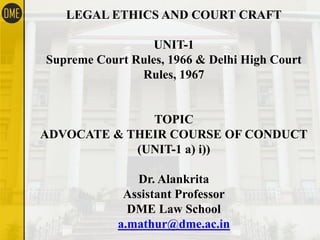
Advocate and their Course of Conduct SC.pdf
- 1. LEGAL ETHICS AND COURT CRAFT UNIT-1 Supreme Court Rules, 1966 & Delhi High Court Rules, 1967 TOPIC ADVOCATE & THEIR COURSE OF CONDUCT (UNIT-1 a) i)) Dr. Alankrita Assistant Professor DME Law School a.mathur@dme.ac.in
- 2. Objectives and Learning Outcome • To impart knowledge as to profession’s values, ethics, and standards among students. • Students will be equipped to face professional dilemma and solve real life problems. • Develops critical and pragmatic thinking and commitment to the profession through the court craft skills.
- 3. Suggested Readings • Supreme Court Rules, 1966. • Supreme Court Rules, 2013. • Handbook on Practice and Procedure and Office Procedure, Supreme Court of India, 2017. • https://main.sci.gov.in/pdf/LU/ppop2017.pdf • https://main.sci.gov.in/sites/default/files/Supr eme%20Court%20Rules%2C%202013.pdf
- 4. Advocate and their Course of Conduct • Under Supreme Court Rules, 1966 [Please refer Supreme Court Rules, 2013 for New Rules]- Definition of- • ‘Advocate’- Order I, Rule 2(1)(a). • ‘Advocate on Record’- Order I, Rule 2(1)(b). • ‘Senior Advocate’- Order I, Rule 2(1)(q). • Advocates and Course of Conduct- Order IV.
- 5. Advocate and their Course of Conduct Order IV of the SC Rules, 1966. [Also Refer order IV of SC Rules, 2013] • The Chief Justice and the Judges may, with the consent of the advocate, designate an advocate as senior advocate if in their opinion by virtue of his ability, [standing at the Bar or special knowledge or experience in law] the said advocate is deserving of such distinction.
- 6. (b) A senior advocate shall not- (i) file a vakalatnama or act in any Court or Tribunal in India; (ii) appear without an advocate on record in the Court or without a junior in any other Court or Tribunal in India; (iii) accept instructions to draw pleadings or affidavits, advise on evidence or do any drafting work of an analogous kind in any Court or Tribunal in India or
- 7. undertake conveyancing work of any kind whatsoever but this prohibition shall not extend to settling any such matter as aforesaid in consultation with a junior; (iv) accept directly from a client any brief or instructions to appear in any Court or Tribunal in India. • Upon an advocate being designated as a senior advocate, the Registrar shall communicate to all the High Courts and the Secretary to the Bar Council of India [and the Secretary of the State Bar Council concerned] the name of the said Advocate and the date on which he was so designated.
- 8. • Every advocate appearing before the Court shall wear such robes and costume as may from time to time be directed by the Court. • Advocate on record shall be entitled to file an appearance or act for a party in the Court. • Advocate on Record should not indulge in any misconduct or of conduct unbecoming of an advocate on record.
- 9. • Any advocate on record may at any time by letter request the Registrar to remove his name from the register of advocates on record, absolutely or subject to his continuing to act as advocate on record in respect of all or any of the pending cases in which he may have filed a vakalatnama, of which he shall file a list. The Registrar shall thereupon remove his name from the register of advocates on record, absolutely or subject as aforesaid. • No advocate other than an advocate on record shall appear and plead in any matter unless he is instructed by an advocate on record.
- 10. CONCLUSION Advocates, in addition to being professionals, are also officers of the courts and play a vital role in the administration of justice. Accordingly, the set of rules that govern their professional conduct arise out of the duty that they owe the court, the client, their opponents and other advocates. (BCI Rules)